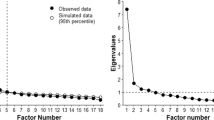Abstract
Introduction and hypothesis
The aim of this study was to translate the King’s Health Questionnaire (KHQ) into Turkish and to test its reliability and validity among Turkish women with urinary incontinence (UI).
Methods
Three hundred and thirty-five women with symptoms of UI completed the Turkish versions of the KHQ, short forms of the Urogenital Distress Inventory (UDI-6) and Incontinence Impact Questionnaire (IIQ-7), and the Incontinence Severity Index (ISI). Psychometric analysis of the KHQ included assessments of test–retest reliability, internal consistency, construct, and criterion validity. Factor analysis was used to explore the underlying structure of the KHQ.
Results
The internal consistency (Cronbach’s alpha ≥0.68) and test–retest reliability of the KHQ were found to be high (p < 0.001). Interdomain correlation analysis showed good convergent validity among Role, Physical, and Social Limitations, with relatively higher correlations and divergent validity between Personal Relationships and other domains, with relatively lower correlations. Exploratory factor analysis identified three factors, namely, Daily Life and Emotions, Personal Relationship, and General Health Perception. The KHQ was also significantly correlated with IIQ-7, UDI-6, and ISI (p < 0.01).
Conclusions
The results suggest that the Turkish KHQ is a valid and reliable condition-specific quality of life instrument for Turkish women with UI.
Similar content being viewed by others
References
Haylen BT, de Ridder D, Freeman RM, Swift SE, Berghmans B, Lee J, Monga A, Petri E, Rizk DE, Sand PK, Schaer GN (2010) An International Urogynecological Association (IUGA)/International Continence Society (ICS) joint report on the terminology for female pelvic floor dysfunction. Int Urogynecol J 21(1):5–26. doi:10.1007/s00192-009-0976-9
Coyne KS, Sexton CC, Irwin DE, Kopp ZS, Kelleher CJ, Milsom I (2008) The impact of overactive bladder, incontinence and other lower urinary tract symptoms on quality of life, work productivity, sexuality and emotional well-being in men and women: results from the EPIC study. BJU Int 101(11):1388–1395. doi:10.1111/j.1464-410X.2008.07601.x
Mattiasson A, Djurhuus JC, Fonda D, Lose G, Nordling J, Stohrer M (1998) Standardization of outcome studies in patients with lower urinary tract dysfunction: a report on general principles from the Standardisation Committee of the International Continence Society. Neurourol Urodyn 17(3):249–253
Bjelic-Radisic V, Dorfer M, Tamussino K, Greimel E (2005) Psychometric properties and validation of the German-language King’s Health Questionnaire in women with stress urinary incontinence. Neurourol Urodyn 24(1):63–68. doi:10.1002/nau.20092
Fitzpatrick R, Fletcher A, Gore S, Jones D, Spiegelhalter D, Cox D (1992) Quality of life measures in health care. I: applications and issues in assessment. BMJ 305(6861):1074–1077
Uemura S, Homma Y (2004) Reliability and validity of King’s Health Questionnaire in patients with symptoms of overactive bladder with urge incontinence in Japan. Neurourol Urodyn 23(2):94–100. doi:10.1002/nau.10169
Kelleher CJ, Cardozo LD, Khullar V, Salvatore S (1997) A new questionnaire to assess the quality of life of urinary incontinent women. Br J Obstet Gynaecol 104(12):1374–1379
Reese PR, Pleil AM, Okano GJ, Kelleher CJ (2003) Multinational study of reliability and validity of the King’s Health Questionnaire in patients with overactive bladder. Qual Life Res Int J Qual Life Asp Treat Care Rehab 12(4):427–442
Okamura K, Nojiri Y, Osuga Y (2009) Reliability and validity of the King’s Health Questionnaire for lower urinary tract symptoms in both genders. BJU Int 103(12):1673–1678. doi:10.1111/j.1464-410X.2008.08335.x
Bonett DG (2002) Sample size requirements for testing and estimating coefficient alpha. J Educ Behav Stat 27(4):335–340
Cam C, Sakalli M, Ay P, Cam M, Karateke A (2007) Validation of the short forms of the incontinence impact questionnaire (IIQ-7) and the urogenital distress inventory (UDI-6) in a Turkish population. Neurourol Urodyn 26(1):129–133. doi:10.1002/nau.20292
Sandvik H, Seim A, Vanvik A, Hunskaar S (2000) A severity index for epidemiological surveys of female urinary incontinence: comparison with 48-hour pad-weighing tests. Neurourol Urodyn 19(2):137–145
Bradley CS, Rovner ES, Morgan MA, Berlin M, Novi JM, Shea JA, Arya LA (2005) A new questionnaire for urinary incontinence diagnosis in women: development and testing. Am J Obstet Gynecol 192(1):66–73. doi:10.1016/j.ajog.2004.07.037
Sandvik H, Hunskaar S, Seim A, Hermstad R, Vanvik A, Bratt H (1993) Validation of a severity index in female urinary incontinence and its implementation in an epidemiological survey. J Epidemiol Community Health 47(6):497–499
Viana R, Viana S, Neto F, Mascarenhas T (2015) Adaptation and validation of the King’s Health Questionnaire in Portuguese women with urinary incontinence. Int Urogynecol J. doi:10.1007/s00192-015-2628-6
Frick AC, Huang AJ, Van den Eeden SK, Knight SK, Creasman JM, Yang J, Ragins AI, Thom DH, Brown JS (2009) Mixed urinary incontinence: greater impact on quality of life. J Urol 182(2):596–600. doi:10.1016/j.juro.2009.04.005
Wyman JF, Harkins SW, Choi SC, Taylor JR, Fantl JA (1987) Psychosocial impact of urinary incontinence in women. Obstet Gynecol 70(3 Pt 1):378–381
Conflicts of interest
None.
Author information
Authors and Affiliations
Corresponding author
Rights and permissions
About this article
Cite this article
Kaya, S., Akbayrak, T., Toprak Çelenay, Ş. et al. Reliability and validity of the Turkish King’s Health Questionnaire in women with urinary incontinence. Int Urogynecol J 26, 1853–1859 (2015). https://doi.org/10.1007/s00192-015-2786-6
Received:
Accepted:
Published:
Issue Date:
DOI: https://doi.org/10.1007/s00192-015-2786-6



